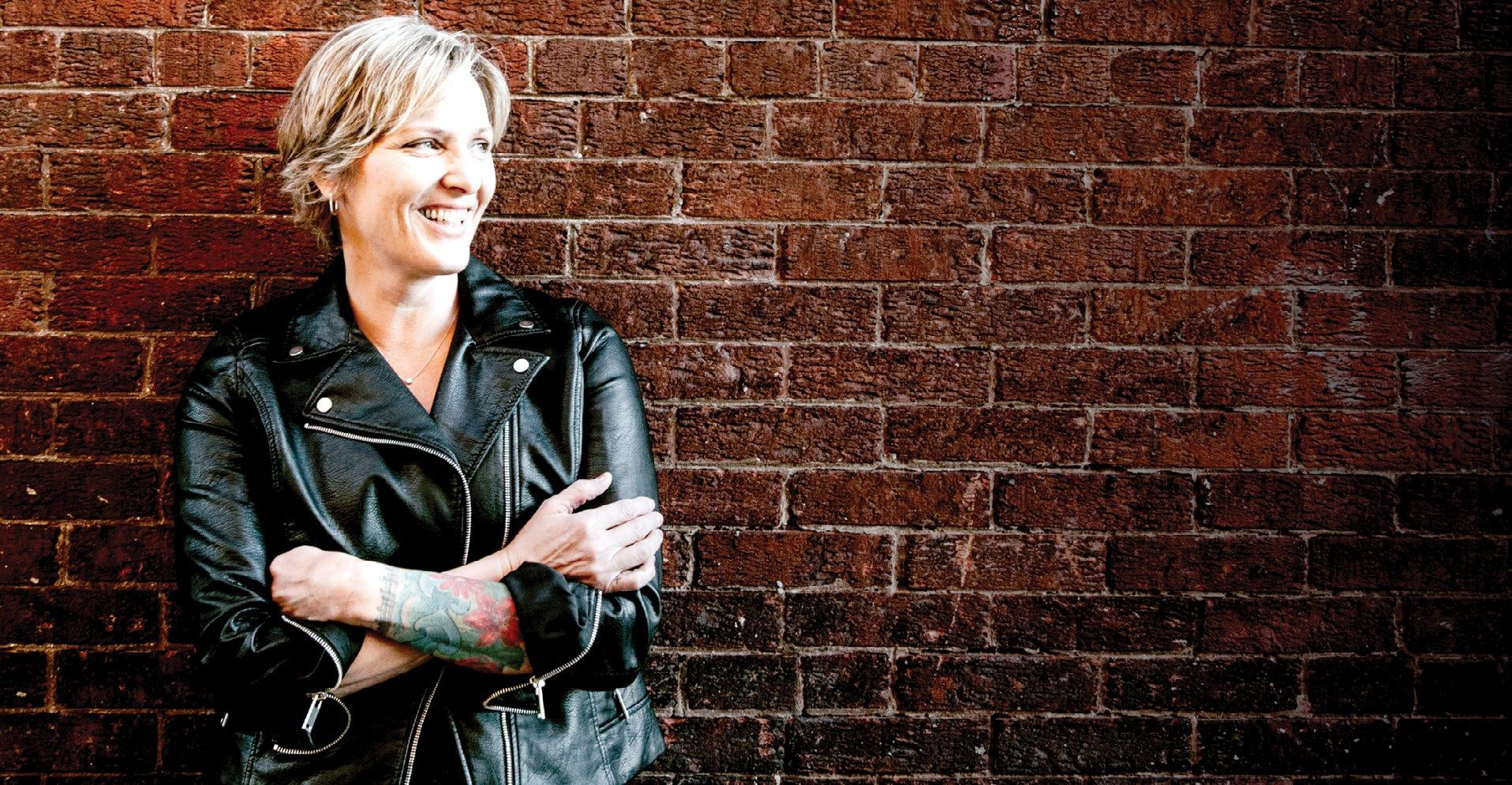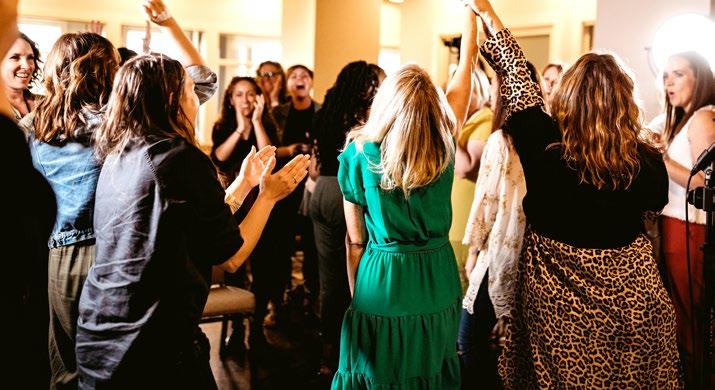
It’s time to move forward
A new Bible course, a podcast on sexual abuse and bootcamps to empower female leaders are just three projects Danielle Strickland has run in the past few months. Before she spoke at ELS last month, we asked her about her energetic ministry
Danielle, you have so many initiatives and resources. What’s been your focus for 2023 so far?
I began the year by taking January as a sabbatical; using the whole month to pray, reflect and make space for God and my relationship with him. I came away from that with a sense of movement.
What I mean by that is I feel we’ve been talking a lot about change and theology and these sorts of things, but actually it’s time to move forward. So that’s the theme I’m working on this year.
We’ve just released a free course with World Vision called The Liberating Move of God which looks at how ordinary people have been the ones to set great liberating movements of God in motion. It chronicles five women who were at the beginning of the Exodus story before Moses arrived, then five more in the story of Jesus.
I took the course myself and was reminded how cool it is to see God beginning to move and make a new way for people.
You did a podcast series recently about sexual abuse. Is that still a focus area for you?
I don’t want it to be, but it feels like one of those moments – like in Ezekiel where God takes Ezekiel by his hair and says, “Before we can do anything else I need you to see the sin of Israel.” I know people have been praying for revival for a long time, but what precedes revival is repentance, so I wonder if this is a season where God is saying, “I’m going to show you these things so we can get ready for revival”.
Sexual abuse is a tragic, sad reality and I feel like this topic keeps coming my way because God is saying we need to talk about it. We’ll probably turn the podcast into some sort of resource for churches because people need to know about it. We need to help the church understand this issue so it’s not a secret. We need to support survivors too, whether they’ve experienced abusive practices through the church themselves or they’ve been brave enough to speak out for others.
I think truth is a light that the whole church needs in order to find its way with this. I’d like to encourage leaders to reject the normal knee-jerk reaction of silence and control, and instead to put the truth on a stand and bring light to the whole house.
And I hear you’re also running a women’s bootcamp in Birmingham this month…
Yes, that’s exciting! We’re trying to help women communicate with authority and power through coaching and connection with our community. The bootcamps are a two-day firehose of intense workshops with a mixture of theory and practice in things like public speaking. They’re gaining traction around the world.
They can focus on specific issues. We’re running our first ever Better Together bootcamp in June in Chicago, for example, where we’ll invite men and women to come together.
Regarding the abuse conversation, we did our first ever ‘Story Strong’ bootcamp in January for survivors of trauma who want to tell their stories. The idea here is that people have their own voice – we don’t have to speak on their behalf – but we need to create a safe place where survivors can speak without being retraumatised.
 Empowering women to share the gospel is a passion of Danielle’s
Empowering women to share the gospel is a passion of Danielle’s
These bootcamps are part of your wider work to develop and equip women…
A lot of women communicators, whether they’re in church, a business community or a non-profit, feel lonely and isolated. Our desire is to show them they’re not alone and that they can find support and care in our community.
We have a coaching platform, and once a month different coaches come and speak to our network. We have Q&As and small group sessions. We have sessions where people can hash out their ideas in groups and support each other. If they want to launch a podcast, for example, we can invite an expert in this area to speak.
We’ve had coaches talk about writing too. A couple of people actually had book proposals approved because they did this small group coaching with us.
Basically, we ask women what they need and then ask how we can use this platform to help them.
Two years ago you were just launching an affordable housing project. How’s that going?
That’s our In My Back Yard – IMBY – project where we’re aiming to have tiny houses in people’s back yards in order to share what we have with those who are in crisis for affordable housing.
It feels like God is asking the church to rethink how it is a witness in the world today, so I feel the IMBY idea is not only theologically rich – in that we should be the ones to offer an alternative community to the world – but also a practical solution to something the world is struggling with right now. In terms of where we’re at with this, we’ve got four different communities in the US that are in the process of building tiny houses and we’ve put a training series together on this for churches too. We’re wading our way through some of the bureaucracy at the moment because this is something new, but there is a lot of energy and need in this space, so we’re pretty excited.
We haven’t actually started this in the UK yet, but it’s an idea that’s out there now. If anybody feels the Spirit leading them to get involved please get in touch!
Co-missioned
Danielle spoke about men and women leading well together at Elim’s Co-missioned leaders’ summit. We asked her about it.
This theme means a lot to me. I wrote a book called Better Together, looking at how women and men can heal the divide and work towards changing the future.
I think the gender divide is at the centre of a lot of the controversy in the church today in terms of the exposing of abusive practices and the centring of male celebrity.
It goes back a long way – it was probably the first issue that took a hit in Genesis, so it’s also the final thing that needs to heal in terms of bringing God’s kingdom in the way he intended.
That means it’s the hardest issue though, the most deeply entrenched and embedded, but it also holds the most power for change, so it’s deeply meaningful for me.
We have to be really honest and contend with the harm of doing things without relationship and equity. We need to show more humility and recognise the harm that’s been done, not only to women but also to men as we have perpetuated a gender-based power structure.
We also have to recognise that change needs to happen through relationship – honest, genuine, equitable, real, robust relationships. We can’t do this apart from God and without others. That’s how we’re supposed to work out our faith, so I would say working together is the most important thing!
Foundations that shaped my faith
What are the moments that shaped Danielle’s faith and ministry?
My Christian and spiritual life was really shaped by my Salvation Army tribal history DNA – by things like the way Catherine Booth advocated for female preaching and the beautiful way the Booths held social and personal salvation in the same place.
The Salvation Army is full-on and you’re immersed in everything. It was very formative and I loved it. Some of the DNA on social justice and change and solidarity with the marginalised are deeply embedded in me.
And when we’re talking about the idea of men and women working well together, that would be second nature to me in a place like the Salvation Army where that has been happening for a long time.
I was mentored by many, many heroes of the faith – church planters, social justice advocates – who are strong female leaders.
Watch Danielle Strickland at ELS23
God’s power will always be a confrontation to the powers of this world. How do we fight against the principalities and power of this world using God’s power in a way that brings life? Rooted in Acts 10 and Acts 16.
God’s power is as different from as it is greater than any other power. How can we live the alternative vision of the good gospel in the present moment? We need power. Rooted in Acts 1 and Exodus 3.
This article first appeared in the May 2023 edition of Direction Magazine. For further details, please click here.
Enjoy this article? Don't forget to share